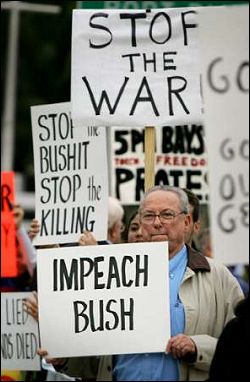Bishop Spong lectures on God and belief
Tucked away in the financially exhibitionist community of
His lecture began as his book begins on the nature of God and our corruption of God. Jesus on the cross hung over the bishop while he spoke, a symbol seldom seen in Episcopal churches. He did not mention Jesus a great deal but focused instead on the Old Testament God personality and our embracement of it. God of the Old Testament is to be questioned, challenged and in some cases denied or ignored. Bishop Spong unfortunately did not get the point across that we Christians witness the New Testament/ new covenant of Jesus the Christ and should place emphasis on it rather then the Old Testament. Respect of the Old Testament should still be observed however.
Bishop Spong finds fault with how the secular world defines God and uses God for corruptible reasons. His examples are: sports teams that invoke God in order to win victory in sport, politicians that invoke God to support partisanship, nations that invoke God to bless endeavors of the state. These invocations corrupt God because they place God into a context of our design.
Placing God into a context should be questioned and challenged because the context deludes the eternal nature of God. God should not be humanized. God should not be tribalized. God is not limited to our practices, geography, institutions, and time as we are. God is eternal and unknowable as a Jewish tradition dictates.
We mistakenly tribalize God, we believe he shows favoritism to our group and opposes other groups whom we oppose. God is reduced to a tribal deity. The origin of this tribalism is the Old Testament, the Jewish perception of God. God supported the Jews and opposed the Egyptians, etc. God had a special relationship with Jewish figures, Abraham, Moses, Noah, etc and a contemptuous relationship with others. The special relations expressed by the Jews has been adopted by today’s Christians, every Christian faith believes that they are special to God. Our act to confine and define God is contrary to God’s true nature, indefinable, not limited to a context. We dwell on what God is not and it becomes our truth.
Spong continued to reveal how science has broken our definitions of God. Astronomers, astronaughts have discovered new worlds beyond the historically defined realm of God, just above the clouds. Biologists have discovered evidence of our origin not defined in our sacred books. God, no, our definition of God has changed and is apt to change further. Spong believes that religious tradition is dying and he illustrates that point by mentioning that the largest growing segment of the Christian world is Christians leaving Christianity.
After listening to Spong for an hour one might believe that he is a critic of everything and an advocate of little. But he does advocate, he sees hope in the voice of the minority contained in the bible. He advocates that we should not look for God but for his footprint. When we look for God we see him as designed by us. When we look for God’s footprint we see evidence of God but not God directly and so God’s integrity is preserved.
After the lecture he welcomed questions. Time only permitted for two questioners. He insisted that a woman shall ask first and then a man. The first question was about prayer and how we should pray correctly, earlier in the lecture he commented that we are doing it wrong. It is wrong to ask for special consideration from God. It is wrong to limit God who is truly limitless. Spong mentioned briefly how to pray while maintaining God’s integrity but the subject of prayer is too extensive to be debated in the time given.
The second question was on same-sex marriage, Spong is in favor. The bishop never suggested that there is a biblical argument for gay marriage he admitted that the bible provides no argument for it. Spong did not go outside the canon to suggest an argument for gay marriage and so he did not migrate into the heretical. His arguments for it came predominantly from secular belief; medicine’s inability to cure or determine a medical explanation, psychology’s reassessment from abnormal psychology to normal psychology, etc.
My assessment of Bishop Spong is that he is a religious man but influenced by secular belief. He did not appear to me to be heretical; he never suggested that Jesus was gay for example. His presentation of ideas can be seen as shocking, blasphemous, and incorrect. He needs to make his intentions clearer and define for his audience better where the faults lay, with Christianity or belief. He needs to argue from a theological perspective first and secular second. He should continue to point out the faults of Christianity but make it very clear that his intentions are to heal and not to attack as will be perceived.
Bishop Spong believes that a church should empower people to be all that they can be. A church should liberate the soul. Unfortunately he did not explain himself but only offered this viewpoint in closing. If heresy is defined by considering secular beliefs then Bishop Spong might be guilty of heresy. If publicly discussing the wrongs of Christianity is an attempt to heal then he might be guilty of healing. Bishop Spong should more clearly reveal his intentions out of consideration to Episcopal laity. Episcopalians should investigate his ideas further, read his books, listen to opposing views and reach a conclusion independently because the eternal covenant between an individual and God matters more then the temporal relationship between an individual and the church.





<< Home